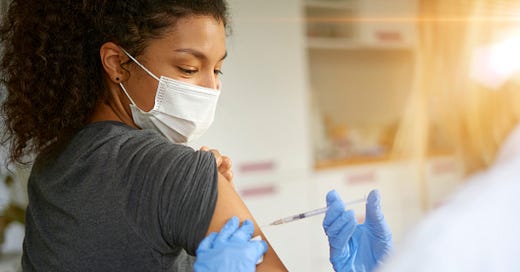There have been quite a few people wondering if their COVID-19 vaccination triggered menstrual irregularities, such as missed periods, heavy periods, and spotting between periods. As impact on menstruation was unfortunately not part of the original prospective studies that compared the vaccines with placebo, which would have been the ideal time to study this, we have very little information on the matter.
There are several reasons that there could be a link between COVID-19 vaccination and menstrual abnormalities. I have discussed it at length in a prior post that you can read here, but to summarize:
The vaccine may trigger the immune system in the lining of the uterus (the endometrium). The endometrium performs many vital immune functions, from protecting the body from infections to menstruation, to implantation of an embryo. An impact on the endometrium could cause irregular bleeding at any phase in the menstrual cycle and/or heavy bleeding.
Impact on the hormones released by the brain and/or ovary that trigger menstruation. To me this seems the least plausible mechanism. The most likely way an injection (or any medication) would delay menstruation via these hormones would be by affecting the surge of leutinizing hormone, a hormone needed to trigger ovulation and menstruation. The delayed period could also be heavier. However, the preclinical studies on rats showed no impact on fertility, meaning no impact on the hormonal changes necessary for ovulation and then pregnancy. While rats have estrus cycles and don’t menstruate, the hormonal changes in the brain are a common model used to replicate what might happen in the human brain. What about those people who report bleeding a few days after vaccination? To do this the vaccine would have to block progesterone, but as it is not associated with miscarriage or lower rates of success with IVF, this mechanism also seems unlikely isn’t possible.
Stress. Arranging a vaccine when the vaccine first came out in North America was VERY stressful. Websites crashed and for many the system was confusing and/or unworkable. Getting the vaccine itself was also very emotional for many people, and understandable so. I cried when my son with heart and lung conditions was vaccinated back in April. There is also the fear generated by awful people, like Dr. Christiane Northrup, who spread lies about the vaccines and fertility. Stress impacts every biological system and this could result in any manner of menstrual abnormalities. A placebo group would be needed to study this effect. Also, as the stress surrounding vaccination seems to have decreased, evaluating tis possibility will likely prove challenging, but that doesn’t mean that we shouldn’t try.
Coincidence and bias. Menstrual irregularities are common, so a percentage of people who get vaccinated will also have unrelated menstrual abnormalities and may erroneously link the two, meanwhile the same percentage of menstrual irregularities is also happening among the unvaccinated. As people with medical conditions and those who were older were among the first to get vaccinated, we may have seen more reports as those groups are statistically more likely to have menstrual irregularities. And finally, people who were vaccinated and had no menstrual irregularities are less likely to discuss that publicly, so the percentage of people discussing menstrual irregularities online would skew to those who had recently been vaccinated.
Fortunately, there is a new study that may help us sort this out and it is enrolling people now! It’s called the COVID Menses study and it is being run by Dr. Mostafa Borahay, MD, Ph.D., an Associate Professor of Gynecology at Johns Hopkins. You can apply to enroll if you meet the following criteria:
Age between 18 and 55
Have had at least one menstrual cycle in the past 12 months
English-speaking
Intend to get a COVID-19 vaccine in the near future.
Live in the United States
The study does not provide the vaccine.
The study is virtual, so no in person visits are required. Participants will record 1 menstrual cycle prior to receiving the COVID-19 vaccine and 2-3 cycles after vaccination. This will be done using a menstrual diary counting pads and/or tampons used every day. The information will be collected daily via a survey that should take 1-2 minutes to complete. This is a great aspect of the study as the information will be collected as it happens.
You can find more about the study here.
This study will only give us the rate of menstrual irregularities pre and post COVID-19 vaccination, it can’t tell us if there is definitely a link — meaning cause and effect — as there is no placebo group (and at this point a placebo group would be unethical). However, if there is no difference before and after vaccination that would reduce the likelihood of a vaccine effect. If there are menstrual irregularities, then that tells us more studies are clearly needed. The type of bleeding abnormalities and when they happen after vaccination may help narrow down a potential mechanism, but most importantly they will help inform the design of future vaccine studies.
Menstrual irregularities and vaccination have been long neglected, and those who have reported their own irregularities have helped alert doctors and researchers to this unacceptable knowledge gap. We should be able to tell people what percentage will have menstrual abnormalities after a vaccination, just like we can tell people what percentage will have a fever or headache. This is absolutely possible to study, after all, we know about menstrual abnormalities after a steroid injection (think an epidural injection or an injection in the joint), so I am able to warn all of my patients about that possibility.
Hopefully the COVID Menses study will enroll sufficient people to answer some question about vaccines and menstrual irregularities and hopefully we will see menstrual tracking in more vaccine studies in the future.





